exam questions with answer ,class notes
EXCELLENT HOMEWORK HELP AND TUTORING ,ALL KIND OF QUIZ AND EXAMS WITH GUARANTEE OF A
Am an expert on major courses especially; psychology,Nursing, Human resource Management and Mathemtics Assisting students with quality work is my first priority. I ensure scholarly standards in my documents and that's why i'm one of the BEST GOLD RATED TUTORS in STUVIA. I assure a GOOD GRADE if you will use my work.
- 211
- 0
- 1
Community
- Followers
- Following
209 items
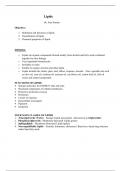
Lipids
Lipids Objectives 1. Definition and functions of lipids 2. Classification of lipids 3. Chemical properties of lipids Definition: o Lipids are organic compounds formed mainly from alcohol and fatty acids combined together by ester linkage o Very important biomolecules o Insoluble in water o Soluble in organic solvents and other lipids o Lipids include fats, butter, ghee, lard, tallow, terpenes, steroids. Also vegetable oils such as olive oil, corn oil, soybean oil, semsem oil, sun f...
- Class notes
- • 15 pages •
Lipids Objectives 1. Definition and functions of lipids 2. Classification of lipids 3. Chemical properties of lipids Definition: o Lipids are organic compounds formed mainly from alcohol and fatty acids combined together by ester linkage o Very important biomolecules o Insoluble in water o Soluble in organic solvents and other lipids o Lipids include fats, butter, ghee, lard, tallow, terpenes, steroids. Also vegetable oils such as olive oil, corn oil, soybean oil, semsem oil, sun f...
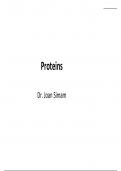
Proteins
Proteins • Proteins account for more than 50% of the dry mass of most cells • Most varied of the biomolecules • Categorized by func on Protein function Storage Examples: Casein, the protein of milk, is the major source of amino acids for baby mammals. Plants have storage proteins in their
- Exam (elaborations)
- • 33 pages •
Proteins • Proteins account for more than 50% of the dry mass of most cells • Most varied of the biomolecules • Categorized by func on Protein function Storage Examples: Casein, the protein of milk, is the major source of amino acids for baby mammals. Plants have storage proteins in their

Campylobacter & Helicobacter
Campylobacter & Helicobacter General Characteristics Common to Superfamily Gram-negative Helical (spiral or curved) morphology; Tend to be pleomorphic Characteristics that facilitate penetration and colonization of mucosal environments (e.g., motile by polar flagella; corkscrew shape) Microaerophilic atmospheric requirements Become coccoid when exposed to oxygen or upon prolonged culture Neither ferment nor oxidize carbohydrates History...
- Exam (elaborations)
- • 59 pages •
Campylobacter & Helicobacter General Characteristics Common to Superfamily Gram-negative Helical (spiral or curved) morphology; Tend to be pleomorphic Characteristics that facilitate penetration and colonization of mucosal environments (e.g., motile by polar flagella; corkscrew shape) Microaerophilic atmospheric requirements Become coccoid when exposed to oxygen or upon prolonged culture Neither ferment nor oxidize carbohydrates History...
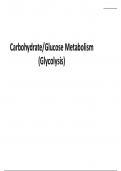
Carbohydrate/Glucose Metabolism
Carbohydrate/Glucose Metabolism (Glycolysis) Glycolysis: An Overview • Glycolysis, the major pathway for glucose oxidation, occurs in the cytosol of all cells. • It is unique, in that it can function either aerobically or anaerobically, depending on the availability of oxygen and intact mitochondria. • It allows tissues to survive in presence or absence of oxygen, e.g., skeletal muscle. • Red blood cells (RBCs), which lack mitochondria, are completely reliant on gluc...
- Class notes
- • 43 pages •
Carbohydrate/Glucose Metabolism (Glycolysis) Glycolysis: An Overview • Glycolysis, the major pathway for glucose oxidation, occurs in the cytosol of all cells. • It is unique, in that it can function either aerobically or anaerobically, depending on the availability of oxygen and intact mitochondria. • It allows tissues to survive in presence or absence of oxygen, e.g., skeletal muscle. • Red blood cells (RBCs), which lack mitochondria, are completely reliant on gluc...
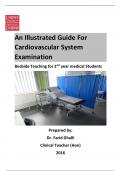
Cardiovascular disease
Cardiovascular disease COMMON PRESENTING SYMPTOMS OF HEART DISEASE Chest pain Chest pain or discomfort is a common presenting symptom of cardiovascular disease and must be differentiated from non-cardiac causes. The site of pain, its character, radiation and associated symptoms will often point to the cause Dyspnoea Left heart failure is the most common cardiac cause of exertional dyspnoea and may also cause orthopnoea and paroxysmal nocturnal dyspnoea. Palpitations Palpitati...
- Class notes
- • 27 pages •
Cardiovascular disease COMMON PRESENTING SYMPTOMS OF HEART DISEASE Chest pain Chest pain or discomfort is a common presenting symptom of cardiovascular disease and must be differentiated from non-cardiac causes. The site of pain, its character, radiation and associated symptoms will often point to the cause Dyspnoea Left heart failure is the most common cardiac cause of exertional dyspnoea and may also cause orthopnoea and paroxysmal nocturnal dyspnoea. Palpitations Palpitati...
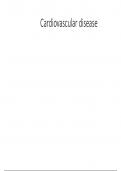
An Illustrated Guide For Cardiovascular System Examination
An Illustrated Guide For Cardiovascular System Examination Bedside Teaching for 2nd year medical Students Prepared by: Dr. Farid Ghalli Clinical Teacher (Hon) 2016 Cardiovascular System Examination Inspection • Shape of precordium • Apex beat • Pulsation in other areas a. Pulmonary b. Parasternal c. Aortic d. Neck e. Epigastric f. JVP Palpation i. Apex beat localization ii. Pulsation in following areas • Pulmonary •...
- Class notes
- • 143 pages •
An Illustrated Guide For Cardiovascular System Examination Bedside Teaching for 2nd year medical Students Prepared by: Dr. Farid Ghalli Clinical Teacher (Hon) 2016 Cardiovascular System Examination Inspection • Shape of precordium • Apex beat • Pulsation in other areas a. Pulmonary b. Parasternal c. Aortic d. Neck e. Epigastric f. JVP Palpation i. Apex beat localization ii. Pulsation in following areas • Pulmonary •...
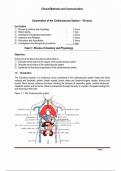
Examination of the Cardiovascular System
Topic 1: Review of Anatomy and Physiology Objectives At the end of the lesson the learner will be able to: - 1) Describe the structure of the organs of the cardiovascular system 2) Describe the functions of the cardiovascular system 3) Explained the functional organization of the cardiovascular system 1.0 Introduction The Circulatory system is a continuous circuit comprising of the cardiovascular system (heart and blood vessels) and lymphatic system (lymph vessels, lymph no...
- Class notes
- • 55 pages •
Topic 1: Review of Anatomy and Physiology Objectives At the end of the lesson the learner will be able to: - 1) Describe the structure of the organs of the cardiovascular system 2) Describe the functions of the cardiovascular system 3) Explained the functional organization of the cardiovascular system 1.0 Introduction The Circulatory system is a continuous circuit comprising of the cardiovascular system (heart and blood vessels) and lymphatic system (lymph vessels, lymph no...
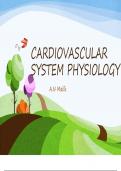
CARDIOVASCULAR SYSTEM PHYSIOLOGY
CARDIOVASCULAR SYSTEM PHYSIOLOGY A.N Malik Functions of the cardiovascular system • Carrying of respiratory gases and nutrients • Heat distribution • Immunity Components of CVS • Heart • Blood vessels • Arteries • Arterioles • Capillaries • Veins General circuitry of CVS Functional histology
- Class notes
- • 67 pages •
CARDIOVASCULAR SYSTEM PHYSIOLOGY A.N Malik Functions of the cardiovascular system • Carrying of respiratory gases and nutrients • Heat distribution • Immunity Components of CVS • Heart • Blood vessels • Arteries • Arterioles • Capillaries • Veins General circuitry of CVS Functional histology
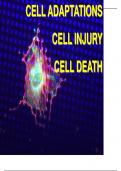
CELL ADAPTATIONS
CELL ADAPTATIONS CELL INJURY CELL DEATH OBJECTIVES Understand the 3 main anatomic concepts of disease---Degenerative, Inflammatory, Neoplastic Understand the concepts of cellular growth adaptations---Hyperplasia, Hypertrophy, Atrophy, Metaplasia Understand the factors of cell injury and death---O2, Physical, Chemical, Infection, Immunologic, Genetic, Nutritional OBJECTIVES Understand the pathologic mechanisms at the SUB-cellular level---ATP, Mitochondria, Ca++, ...
- Class notes
- • 66 pages •
CELL ADAPTATIONS CELL INJURY CELL DEATH OBJECTIVES Understand the 3 main anatomic concepts of disease---Degenerative, Inflammatory, Neoplastic Understand the concepts of cellular growth adaptations---Hyperplasia, Hypertrophy, Atrophy, Metaplasia Understand the factors of cell injury and death---O2, Physical, Chemical, Infection, Immunologic, Genetic, Nutritional OBJECTIVES Understand the pathologic mechanisms at the SUB-cellular level---ATP, Mitochondria, Ca++, ...
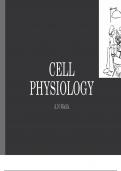
CELL PHYSIOLOGY
CELL PHYSIOLOGY A.N Malik Thursday, September 26, 2024 Overview Functional organization of the body A.N Malik 2 Levels of organization (cell to organism) Thursday, September 26, 2024 A.N Malik 3 Overview • Human physiology: study of the bodily functions of human beings • Cells: a cell is the fundamental functional unit of life in which physiological processes happen. This processes happen within the intracellular fluid(ICF). • Extracellular fluid (ECF)“in...
- Case
- • 127 pages •
CELL PHYSIOLOGY A.N Malik Thursday, September 26, 2024 Overview Functional organization of the body A.N Malik 2 Levels of organization (cell to organism) Thursday, September 26, 2024 A.N Malik 3 Overview • Human physiology: study of the bodily functions of human beings • Cells: a cell is the fundamental functional unit of life in which physiological processes happen. This processes happen within the intracellular fluid(ICF). • Extracellular fluid (ECF)“in...
